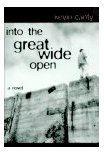Reviews
Into the Great Wide Open, by Kevin Canty
Chad Driscoll

|
|
Into the Great Wide Open.
Kevin Canty.
Nan A. Talese, 1996.
244 pages, $21.95 (hardback).
ISBN: 0385473885
|
Reading Kevin Canty's second book and first novel, Into the Great Wide Open, was a strangely bipolar experience for me. Sometimes thralled, sometimes annoyed, oftentimes both, I had plenty of problems with this story and its telling, but could not deny its influence and power.
Kevin Kolodny, the 17 year-old slacker-protagonist, is a sullen, precocious man-child who's still wishing in one hand and shitting in the other. He is literary, intelligent, emotionally advanced, and for all these reasons, likeable. But he is also prematurely jaded and swaddled with self-pity because he is poor, has a stroke-impaired alcoholic father and, worst of all, drives a Renault. Kenny's biggest problem, however, is that he is too ready to believe in the power of romantic love to save him from the meaningshorn deliriums of his bong-blasted friendships and best-of-show dysfunctional family.
While on a retreat, Kenny falls in love with Junie, the most dangerous babe in high school—a rumored lesbian a failed suicide, a clad-in-black Honda driver—your typical "being young and dipped in folly I fell in love with melancholy" girl (thanks Poe). Canty paints their courtship with an exceptionally fine brush. Those early stages of awkwardness and desperation, the endless baiting and switching, desire's delicious prolonging and even more delicious release—Canty does a great job of rendering these moments, but for me a too thorough job. First meeting to first mating takes up the first eighty pages of the book, and not much happens besides. In fact, the plot of Canty's book could easily be reduced to a few sentences and this was my main source of annoyance with it; there was too little action to carry my interest at times. The amount of characterization Kenny receives in this book is onerous, and if I'm going to get that involved with a character, I want them to godammit do something!
But Kenny's most (only?) significant action doesn't come until what should have been novel's end around page 200. (The last forty pages just tasted like crust after pie.) By this time, Junie (now pregnant) and Kenny (now truant) have already begun to grow apart, so he persuades her to drive off with him to Oregon in a doomed final effort to keep them together. The bleeding that colored Kenny and Junie's first union returns that night in the form of a miscarriage. Sex and feminine gore give a strange circularity to their relationship which comes to a satisfying end long before the novel does. Into the Great Wide Open dodders into a great big mistake when it detains Kenny, Junie and reader in an obviously futile situation.
As obvious and many are this book's flaws, ultimately, I was able to pardon them. The fullness and vividness of Canty's "teenagers in love" make them irresistible characters. Staying on course through the constant movement between emotional impotence and emotional hyperbole—as best I can remember, this seems the essence of that time in one's life. Kenny realizes, and is deeply disturbed by, his inability to feel anything more that a vague ache, a dim discomfort, for his dying father and lunatic mother. Yet passion consumes him in the midst of apathy; he becomes obsessed with keeping his dick wet. Of course, this simple want has a nasty way of confusing itself into love, dreams of marriage, and the like, and Kenny's teenage lust eventually collapses beneath the weight of its elaborations. The demise of first love emerges from its own ruins, however, as a kind of precious failure for Kenny and Junie, one that took courage and dignity to make and will mark them forever.
